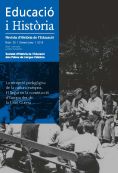Maig del 68 i la incidència en els discursos pedagògics pobres
Article Sidebar

Main Article Content
Albert Esteruelas i Teixidó
Jordi García i Farrero
In this article we analyse what the revolt of May ?68 means for pedagogical
discourses. First of all, we point out some of the incidents prior to the rebellion.
Secondly, we list and describe some of the characteristics that make up the counterspectacular
pedagogical thinking of the French revolt, a fact that has often been
overlooked when analysing this social upheaval. Inside the pedagogies of the French
May, we can detect the importance acquired by the illusion and ability to make the
ordinary something extraordinary, becoming an experience that embeds itself in fate
and extols uncertainty. The pedagogical discourses of May ?68 are characterised by
being fragmentary, adopting the non-dogmatic and often contradictory form of
aphorism and dialogue, being a democratic, communitarian, and vitalist pedagogy,
willing to increase and optimise daily life, and fighting against alienation, that is,
against the espectacle.
discourses. First of all, we point out some of the incidents prior to the rebellion.
Secondly, we list and describe some of the characteristics that make up the counterspectacular
pedagogical thinking of the French revolt, a fact that has often been
overlooked when analysing this social upheaval. Inside the pedagogies of the French
May, we can detect the importance acquired by the illusion and ability to make the
ordinary something extraordinary, becoming an experience that embeds itself in fate
and extols uncertainty. The pedagogical discourses of May ?68 are characterised by
being fragmentary, adopting the non-dogmatic and often contradictory form of
aphorism and dialogue, being a democratic, communitarian, and vitalist pedagogy,
willing to increase and optimise daily life, and fighting against alienation, that is,
against the espectacle.
Article Details
How to Cite
Esteruelas i Teixidó, Albert; García i Farrero, Jordi. “Maig del 68 i la incidència en els discursos pedagògics pobres”. Educació i Història: revista d’història de l’educació, 2019, pp. 125-50, https://raco.cat/index.php/EducacioHistoria/article/view/351513.
Most read articles by the same author(s)
- Albert Esteruelas i Teixidó, Javier Ventura Blanco, La joventut en l'anarquisme (1868-1910) , Educació i Història: revista d'història de l'educació: No. 6: (2003)
- Jordi García i Farrero, Isabel Vilafranca i Manguán, Conrad Vilanou i Torrano, La Recepció de la filosofia de l'educació de Giovanni Gentile: del neoidealisme al neoespiritualisme , Educació i Història: revista d'història de l'educació: Núm. 27 (gener - juny 2016)
- Xavier Laudo Castillo, Albert Esteruelas i Teixidó, Jordi García i Farrero, Idees pedagògiques del taoisme: elements per a una pedagogia líquida entre la naturalesa i la norma , Educació i Història: revista d'història de l'educació: No. 23: (gener-juny 2014)
- Albert Esteruelas i Teixidó, Darwin, els camps d'extermini i el pensament pedagògic del neoliberalisme , Educació i Història: revista d'història de l'educació: No. 21: (gener-juny 2013)
- Albert Esteruelas i Teixidó, Els Estats Units, un model a Catalunya , Educació i Història: revista d'història de l'educació: No. 8: (2005)
- Jordi García i Farrero, Els Passeigs de Rousseau: solitud, rememoració i herborització , Educació i Història: revista d'història de l'educació: No. 19: (gener-juny 2012)
- Ernst Robert Curtius, Albert Esteruelas i Teixidó, El Sentit de l'humanisme = The meaning of humanism / transcripció i presentació d'Albert Esteruelas i Teixidó , Educació i Història: revista d'història de l'educació: No. 9-10: (2006-2007)